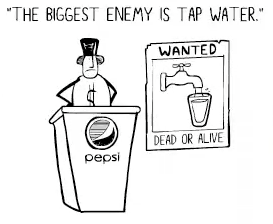 Because of this, these companies decided to create competition with their new enemy (tap water) and manufacture a rival product, bottled water. Obviously, the consumers were shocked and hesitant to drink and invest in this new product. Water was something that they were able to get for free in seconds, just by twisting a button - did they really need to walk to the shops and waste their money on exactly the same thing?!
Because of this, these companies decided to create competition with their new enemy (tap water) and manufacture a rival product, bottled water. Obviously, the consumers were shocked and hesitant to drink and invest in this new product. Water was something that they were able to get for free in seconds, just by twisting a button - did they really need to walk to the shops and waste their money on exactly the same thing?!The crazy companies managed to change our perceptions by doing one simple thing: manufacturing demand. This was done in a variety of ways...
1. Scaring People
A major part in the campaign of making people want bottled water was to tell them that tap water was dirty and unsafe, therefore making people insecure and worried about drinking tap water, and consequently chose to drink the "much safer" bottled water instead. “When we’re done,” one top water executive said, “tap water will be relegated to showers and washing dishes."
